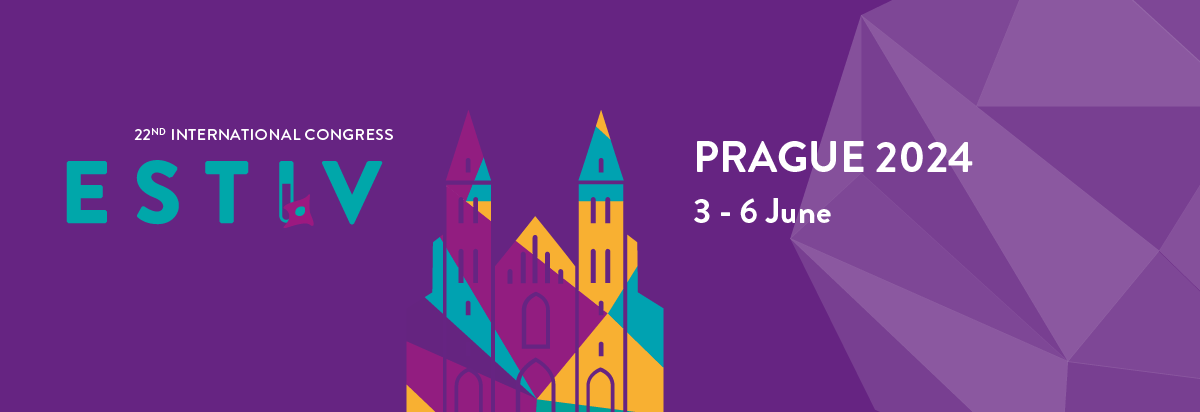
Estiv is offering to all those who still wish to present their science at the ESTIV 2024 Congress the submission of “Last-Minute” Abstracts.
If accepted (in this case only as posters), these abstracts will not be published in the Main ESTIV Abstract book but will be compiled as a separate file published on the ESTIV website along with the Main Abstract book. The format of the Last-minute Abstract book will be simplified. Only abstracts of registered participants who paid their registration fees will be included.
All last-minute abstracts must be submitted via submission module. Abstracts submitted via email or other methods will not be considered.
IMPORTANT DEADLINES
- The deadline for last-minute abstract submissions is 20 May 2024, 10:00 AM CEST.
- The last-minute abstract notification is planned as soon as possible after the submission deadline (at the latest by May 25, 2024).
- We kindly inform you that these abstracts will no longer be added to the Main abstract book, but will be published in a separate document on the ESTIV website.
Please read carefully the submission guidelines below before submitting an abstract.
GENERAL GUIDELINES
- The last-minute abstract should cover the original work.
- The last-minute abstract can be an original work that has previously been published, but this cannot be included in the special edition of TIV. Only original work that has not previously been published can be considered for publication in the special edition of TIV.
- There is no last-minute abstract submission fee.
- The submitter is required to ensure that all co-authors are aware of the contents of the last-minute abstract before submission.
- The same person can submit more than one last-minute abstract. However, a presenting author can present only one poster.
- Submission of a last-minute abstract implies formal commitment by the designated presenting author to register for the congress and to present the last-minute abstrac. However, registration is not required at the time of submission.
- Last-minute abstracts can be edited/updated before the last-minute abstract submission deadline by logging in to the congress account used to submit the last-minute abstract. After the last-minute abstract submission deadline, it will no longer be possible to edit/update submitted last-minute abstracts.
- Last-minute abstract submissions will be eligible only for poster presentation.
- The ESTIV 2024 Scientific Committee will evaluate all last-minute abstracts submitted for poster presentation.
- If accepted, these abstracts will not be published in the Main ESTIV abstract book but will be compiled as a separate file published on the ESTIV website along with the Main Abstract book. The format will be simplified.
- Please note that the corresponding author will receive all correspondence about the last-minute abstracts. For this reason, the presenting author will automatically act as the corresponding author in the system.
- Your last-minute abstract is not successfully submitted until you receive a confirmation email after clicking the final submit button. If you do not receive a confirmation email, please contact us: helpdesk@klinkhamergroup.com.
SUBMISSION GUIDELINES
Last-minute abstracts must be allocated to a specific topic. The topics are:
- Bio-engineering, stem cells and disease models
- Models, biomarkers and assays for endocrine disruption
- Models, biomarkers and assays for systemic and immune toxicity
- Models, biomarkers and assays for developmental toxicity
- Cardiotoxicity and cardiac efficacy models
- Local toxicity testing (safety and efficacy)
- Case studies for successful use and implementation of complex in vitro models
- Challenges in cosmetics safety
- Organ-on-a-chip & Microphysiological Systems
- Regulatory considerations for complex NAMs
- Computational toxicology – in silico modelling, read-across, artificial intelligence and machine learning
- Toxicokinetics and in vitro – in vivo extrapolation
- In vitro systems to assess respiratory toxicity
- Non-animal methods for safety testing of biopharmaceuticals/biotherapies/vaccines
- Knowledge sharing and education
- Funding the development, validation and implementation of NAMs
- ECHA, EMA and EFSA perspectives on the use of NAMs
- In vitro and in silico methods for safety assessment of medical devices
- Role of 3R centres in the dissemination and implementation of NAMs
- Other
Abstracts must be written in English.
- Presenting author’s contact details should be included.
- Please include the author and co-authors’ details, including affiliation and country.
- The last-minute abstract title should be in upper case.
- The last-minute abstract text should be limited to 300 words.
- Any pictures, attachments or similar are not allowed/will not be displayed.
- The submission form allows you to save your last-minute abstracts as a draft in order to make changes prior to submission. After the submission deadline, the latest version of your last-minute abstracts becomes the final one.
- Submit your last-minute abstract before 20 May 2024, 10:00 AM CEST.
